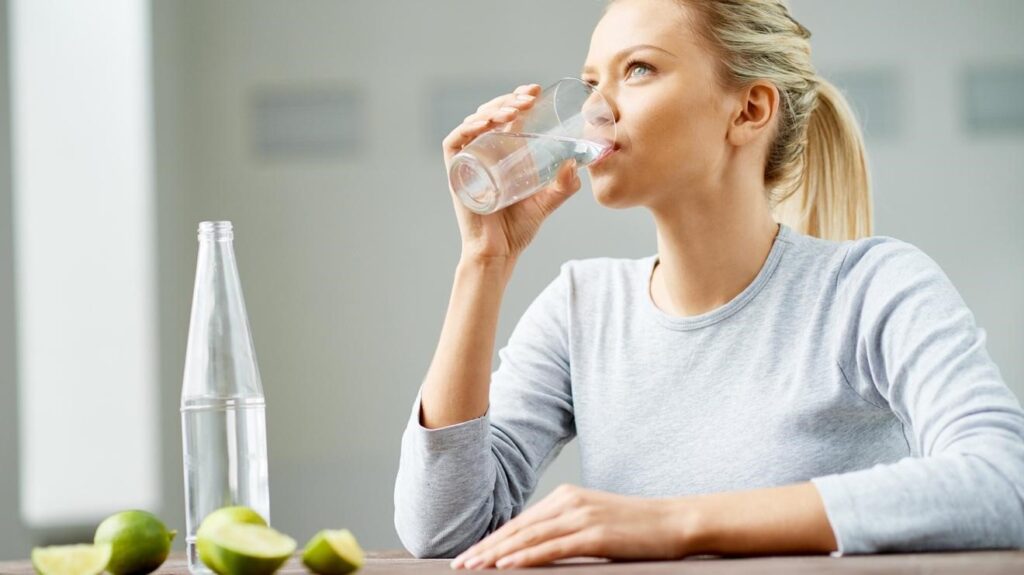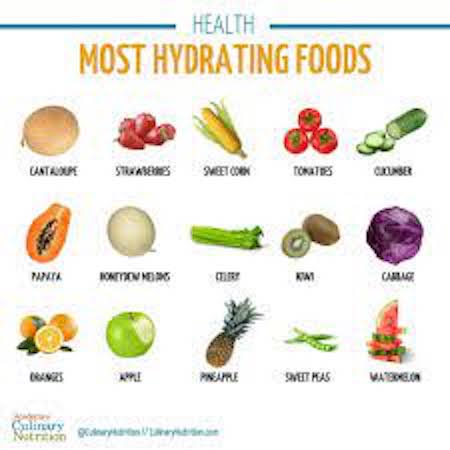
Editor’s Note: I thought it was just me but discovered it wasn’t as I am hearing this from so many……we cannot seem to get enough water; thirsty all of the time!! I opened this topic up to our nutrition expert, Catherine Kruppa, and she, as always, does an excellent job of explaining why!!?
From Catherine of Advice for Eating.……Water makes up more than ½ your body weight. It is used in every cell in your body; therefore, it is important to stay hydrated in this Texas heat. Water is essential for digestion, weight loss, avoiding the afternoon slump, regulating your body temperature, improving your physical performance and much more.
Not drinking enough fluid leads to dehydration. Dehydration results in dry, wrinkled skin. It causes the kidneys to have to work harder. You can see up to a 20% decrease in athletic performance when dehydrated. Dehydration can degrade specific aspects of cognitive performance including tension, anxiety, fatigue as well as impaired motor performance and short-term memory. Opting for water instead of sugary drinks can help decrease body weight and fat levels. One study showed an absolute increase in drinking water led to a 5-pound weight loss over a year without any other changes to diet or exercise. Water plays a crucial role in transporting nutrients and waste products between our major organs and helping regulate temperatures.
How do you know if you are dehydrated?
Mild to moderate symptoms include: thirst, dry mouth, fatigue and a headache. Signs of severe dehydration include rapid breathing, rapid heart rate, severe dizziness or lightheadedness and unconsciousness.
How water effects digestion
Water breaks down food and dissolves vitamins and minerals from food and transports them throughout body. Water is needed to soften stool. Liquid waste is eliminated through the kidneys through urination which needs water to function properly to prevent kidney stones.
How hydration impacts your weight
Many of us mistake thirst for hunger which leads to unnecessary snacking. Drinking water reduces extra calorie intake from soda, juice etc. Water helps to remove toxins and waste from the body. Finally, dehydration leads to water retention and constipation.
How hydration effects physical performance
Exercise generates heat in the body. Sweating helps cool the body by dissipating internal heat.
Warm weather, i.e. Houston summers, escalates this process. As temperature rises so does evaporative heat loss.

A decrease in 1 liter of body water, causes: an increase of internal body temperature of 0.3o C, a cardiac output drop of 1 liter/minute and a heart rate increase of 8 beats/minute. 2-3% body weight loss from sweat loss results in 15-20% performance reduction. Not only will dehydration negatively affect your performance during exercise but puts extra stress on the body which leads to inflammation and can delay recovery.
How much fluid should I drink per day?
Aim to drink half of your body weight in ounces of hydrating fluid per day. If you weigh 150 pounds you should consume a minimum of 75 ounces of fluid. Hydrating fluid includes water, sparkling water, juice, milk, smoothies, soups, and other decaffeinated beverages. Caffeinated beverages and alcohol cause you to lose fluid which leads to dehydration. You know if you are hydrated if your urine is a light lemonade or clear color.
Foods can also contribute to your fluid intake. The highest water containing foods include celery, cantaloupe, tomato, lettuce, blueberries, pineapple, watermelon, cucumber, grapefruit and pears.

Electrolyte balance
It is important to not only stay hydrated but also to make sure your electrolytes are in balance. For instance, taking in too much water during long periods of exercise (multiple hours) without any sodium can lead to hyponatremia which is even more dangerous than dehydration. Since, most of us are not exercising that long the electrolyte we want to focus on is potassium. Most Americans do not come close to taking in enough potassium per day. One banana is equal to 17% of your potassium intake for the day. A recent study reported increasing potassium intake can help reduce water retention. Eating a diet high in fruits and vegetables will help you increase your potassium intake. High potassium foods include: melon, tomatoes, potatoes, bananas, avocado, green beans, and spinach.
In summary, most Americans need to increase their hydrating fluid intake. Increase slowly, add one 8-ounce glass per day to what you are normally drinking until you reach your goal intake. Drink on a schedule to keep your energy level up all day and prevent night time trips to the restroom. Decrease your intake of caffeinated beverages and increase your intake of high potassium foods to help you feel better this summer!
